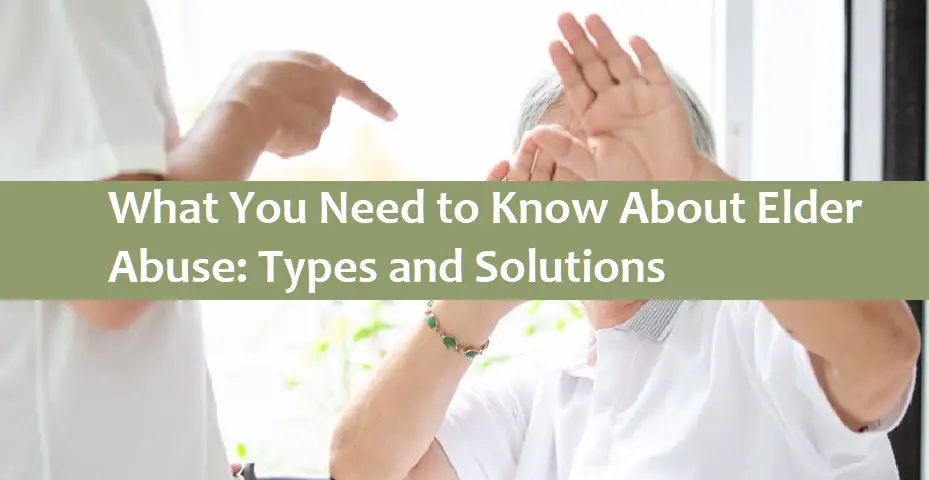Are you aware of what is elderly abuse and why it is such an important issue? Elder abuse, unfortunately, is all too common, affecting thousands of vulnerable seniors every year. From emotional manipulation to financial fraud, the types of elder abuse can vary greatly. It’s more important than ever that we understand what elder abuse is, the various forms it takes, and how we can protect those most vulnerable. In this blog post, we will explore what elderly abuse is, its various types, and potential solutions to prevent it from happening.
About Elder Abuse and Its Impact on Seniors
Elder abuse refers to any harmful or distressing act or inaction, including physical and sexual assault, emotional manipulation, and financial exploitation, that occurs within a relationship where an older person is expected to be trusted. Due to their age, physical frailty, and often living alone, elderly individuals are more prone to abuse.
Furthermore, it is important to note that elder abuse can cause immense harm to the victims. The elderly are more vulnerable to the physical and emotional effects of abuse, resulting in long-term consequences. These may include physical harm, mental anguish, depression, anxiety, and, in severe cases, death.
Types of Elder Abuse
Elder abuse can take many forms, ranging from physical to emotional. Here are some of the most common types of elder abuse:
- Physical Abuse
- Psychological Abuse
- Sexual Abuse
- Financial Exploitation
- Neglect
- Elder Abandonment
Physical Abuse
Physical abuse is any intentional act of violence or force inflicted upon an elderly person. This can include anything from slapping, grabbing, shaking, pushing, and even the use of weapons.
Signs of Physical Abuse:
- Unexplained bruises, cuts, or burns
- Unexpected weight loss
- Injuries that do not match the explanation given
Financial Elder Abuse
Financial exploitation is when someone inappropriately uses an elderly person’s finances, assets, or property. This can include anything from misusing their bank accounts to forging checks or stealing cash and possessions.
Signs of Financial Exploitation:
- Unexplained withdrawals from bank accounts or credit cards
- Unauthorized use of the elder’s money or property
- Changes to legal documents without their knowledge
- A caregiver or family member suddenly has access to new financial resources
Psychological Elder Abuse
Psychological elder abuse is the most difficult to detect as it involves verbal or non-verbal behavior aimed at causing distress or emotional pain. This can include anything from verbal threats, insults, humiliation, intimidation, and isolation.
Signs of Psychological Abuse:
- Withdrawal from activities they once enjoyed
- Unexplained changes in behavior
- Fearfulness or anxiety around certain people
- Confusion or disorientation
Elder Abandonment
Elder abandonment is when a family member or caregiver ignores the needs of an elderly person and abandons them in dangerous situations. This can range from leaving someone at home alone without proper assistance to abandoning them in a public place.
Signs of Abandonment:
- Lack of food, shelter, or medical care
- Being left alone in a public place
- Lack of communication or interaction with family or friends
Elder Neglect
Neglect of the elderly is when a family member or caregiver fails to provide basic needs, such as food, medical care, and shelter. This can lead to malnutrition, dehydration, poor hygiene, and other health issues.
Signs of Neglect:
- Poor personal hygiene
- Unexplained weight loss or dehydration
- Unattended medical needs, such as an untreated infection
- Lack of adequate clothing or food
Sexual Elder Abuse
Sexual elder abuse is any kind of unwanted sexual contact or behavior towards an elderly person, including rape and other forms of sexual assault. This can range from sexually explicit comments to inappropriately touching a senior.
Signs of Sexual Abuse:
- Unexplained bruises or bleeding in private areas
- Unusual fear or anxiety around a specific person
- Sudden changes in mood or behavior
- Torn or bloody clothing
What to Do in Case You Spotted Signs of Abuse
Call 911
If you witnessed that an elderly person is being abused, the most important thing to do is call 911 immediately. Reporting elder abuse helps protect vulnerable adults from further harm and get them the help they need. Make sure to give as much detailed information as possible to the police, including where and when the abuse occurred and any other information you might have gathered.
Talk About It with Your Loved One
If you suspect elder abuse, talk about the situation with care and compassion. Respect your loved one’s boundaries and trust their decisions, even if they don’t want to report the incident. Try to let them know that they are not alone in this and that you are there for them.
Contact Regularly Your Loved One
If your elderly loved one has become a victim of abuse, make sure to check on them regularly. This will let them know that they are not alone and that someone is there for them in case they need help. It also provides an opportunity to spot any potential signs of abuse before it escalates.
Take Your Loved One’s Words Seriously
If your elderly loved one confides in you about any form of abuse, take their words seriously. It is important to remember that seniors may feel embarrassed or ashamed for speaking out about the abuse and that it could be difficult for them to talk about it. Don’t judge them; instead, listen carefully and offer support.
Contact your local Adult Protective Services (APS)
APS is a government-run organization that investigates reports of elder abuse and helps victims to get the help they need. They can provide legal assistance, medical care, and other forms of support for elders who have been abused.
Get Professional Help
It’s essential to seek help from professionals if you suspect or witness any form of elder abuse. Elder abuse can have a long-term and traumatic effect on seniors, so the sooner it is addressed, the better. Find a qualified therapist or social worker specializing in elder abuse and talk to them about your concerns. They can provide resources and support so that you and your loved one get through this challenging time together.
Conclusion
Elder abuse is a serious issue that should not be taken lightly. It’s important to stay alert and take the necessary steps to protect vulnerable adults from harm. If you witness or suspect elder abuse, it’s important to act quickly and contact the authorities so that the situation can be addressed properly.
Additionally, take the time to talk to your elderly loved one and let them know you are there for them. Finally, get professional help if needed so that your loved one can receive the care they deserve. With proper support and resources, seniors who have been victims of elder abuse can heal and move forward with their lives.

Morgan Elfman is a compassionate writer, dedicated caregiver, and passionate advocate for senior well-being. Born and raised with a deep sense of empathy and a natural inclination towards service, Morgan has devoted her life to making a positive impact on the lives of seniors.
As a writer for www.choiceseniorlife.com, Morgan utilizes his skills to create insightful and informative content that addresses the unique needs and challenges faced by seniors and their families. Her articles not only provide valuable information on health, lifestyle, and care options but also strive to inspire and empower seniors to lead fulfilling lives.

